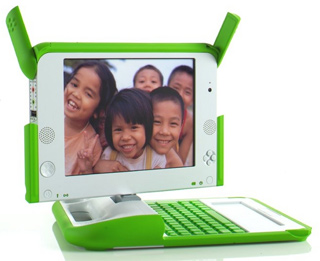$100 laptop hit with production delays
$100 laptop hit with production delays
mongabay.com
October 24, 2007
The “$100 laptop” — a computer designed for children in poor countries — has been hit by production delays and will likely miss an important target date for a charity program, according to reports from InformationWeek and other outlets.
The One Laptop per Child Foundation (OLPC) said that the manufacturing delays will impact the “Give 1 Get 1 program” which would have allowed North Americans purchase two OLPC XO laptops for $399 — one of which would be donated to a child in a developing country.
The announcement comes after OLPC said the cost of the first generation of XO laptops would be around $188 — not the $100 initially projected.

|
The laptops have been billed as a durable low-cost PC for students in developing countries. The project has received support from Google, AMD, Brightstar, News Corporation, Quanta Computer, Microsoft, Intel, and Red Hat. The laptop, which was tested by the U.S. State Department last November, is WiFi- and cell phone-enabled, can be powered using a hand-crank, is equipped a screen viewable in direct sunlight, and features a keyboard that can easily switch between languages. It is designed to be used in harsh environments such as remote rural areas in developing countries and uses only 2 watts of power. The weather-proof laptops will eventually be available in 30 colors, though the first generation will be lime green.
In July OLPC announced its “$100 laptop” was ready to go into mass production after it received orders for 3 million machines, the requisite number to make the project viable. A production run of 300 machines was completed in August.
Some American computer manufacturers have expressed concern that OLPC laptops could end up in U.S. schools, creating fierce competition in the domestic PC market. At the same time falling prices for PCs are becoming increasingly competitive at the price point for the first generation of OLPC machines.
The laptop has faced other criticism, notably from some development experts who say that developing countries should not be asked to foot the bill for what is an unproven technology. Nevertheless the OLPC computer has won acclaim from the U.N. and the U.S. state department. The governments of Argentina, Brazil, Cambodia, Libya, Mongolia, Nigeria, Pakistan, Peru, Rwanda, Thailand and Uruguay are testing or have placed orders for the laptops.